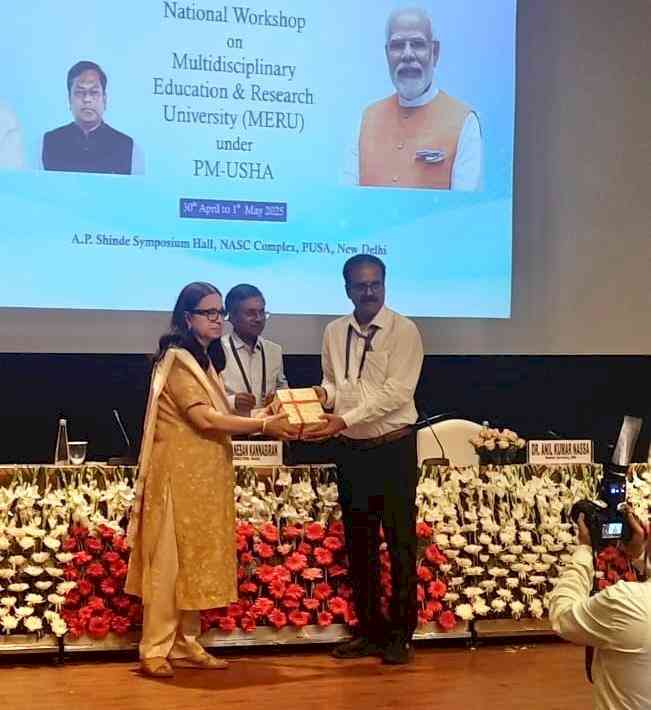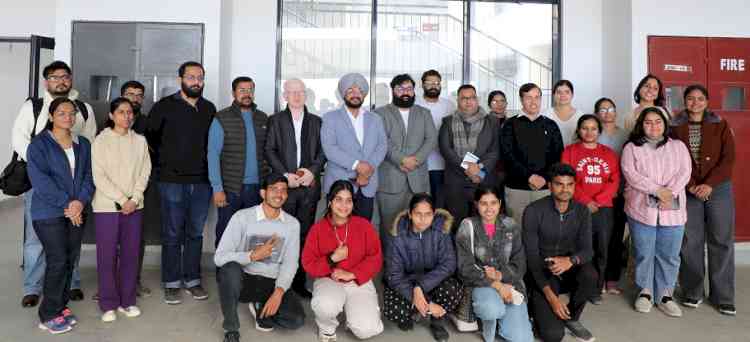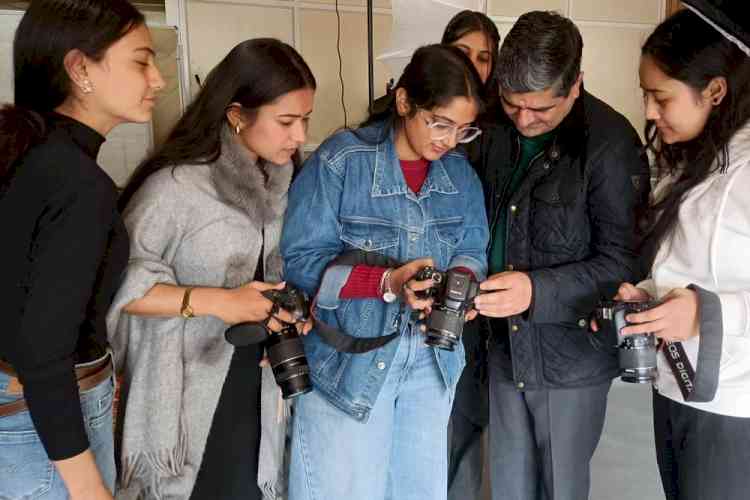Panjab University Vice Chancellor Unveils Ten-Pronged Plan to Transform State Universities at National Workshop
The two-day National Workshop on Multi-Disciplinary Education and Research Universities (MERU) concluded today with a high-impact address by Prof. Renu Vig, Vice Chancellor of Panjab University, who proposed major changes for improving the quality of education imparted by State Public Universities (SPUs).

Chandigarh May 1, 2025: The two-day National Workshop on Multi-Disciplinary Education and Research Universities (MERU) concluded today with a high-impact address by Prof. Renu Vig, Vice Chancellor of Panjab University, who proposed major changes for improving the quality of education imparted by State Public Universities (SPUs).
The Ministry of Education (MoE) had tasked Vice Chancellors from 64 state universities and State Project Directors of RUSA 2.0 across all Indian states with the collaborative development of draft papers addressing twelve distinct thematic areas. Panjab University served as the coordinating institution for a consortium that included HP University Shimla, GJU Hisar, Gondwana University Gadchiroli, and Kannur University, Kannur, under the coordination of State Project Director Sh Rubinderjit Singh Brar, Director Higher Education, Chandigarh.
Held under the Pradhan Mantri Uchchatar Shiksha Abhiyan (PM-USHA), the two days’ workshop was inaugurated by Union Minister of State for Education, Dr. Sukanta Majumdar, at the Indian Council of Agricultural Research (ICAR), New Delhi.
Speaking during the concluding session on ‘Providing Quality Education: Accreditation and Ranking’, Prof. Vig emphasised that the current accreditation and ranking mechanisms must shift from a compliance-oriented approach to one rooted in quality, innovation, and measurable outcomes. She called for making accreditation mandatory for all higher education institutions by 2030 and urged greater alignment with national priorities under the National Education Policy (NEP) 2020 as well as global benchmarks.
While referring to various challenges faced by SPUs, Prof. Vig outlined a ten-dimensional framework for quality enhancement. While appreciating that the policy reforms like the NEP 2020 have introduced transformative changes, she noted that the implementation varies across various states and institutions. She stressed for the importance of curriculum reforms in the universities that is responsive to national needs and global trends, with an emphasis on academic flexibility, interdisciplinarity, and career-oriented learning.
Prof. Vig called for urgent investment in research infrastructure and encouraged the establishment of innovation hubs that link universities with industries, research bodies, and start-ups. She advocated for fully equipped digital libraries, centralised learning management systems, and automated services to ease the administrative burden on students and faculty.
Prof. Vig also highlighted the importance of institutional leadership and governance, urging more autonomy, participative decision-making, and integrated strategic planning. Institutions, she argued, should adopt transparent performance monitoring mechanisms and support faculty through welfare programs, capacity building, and leadership training.
Prof. Vig stressed the need to encourage universities to actively pursue international accreditation, global collaborations, and dual-degree programs to elevate their presence and prestige in the international academic ecosystem.
Prof. Vig’s comprehensive presentation was followed by a question-and-answer session, which drew strong engagement from education leaders across the country, making it a fitting conclusion to the workshop.
The session was chaired by Prof Anil Kumar Nassa, Member Secretary, National Board of Accreditation (NBA), New Delhi and Prof Ganesan Kannabiran, Director National Assessment and Accreditation Council (NAAC). During the session, Dr Nassa, spoke in detail about two accreditation agencies namely NBA and NIRF. He discussed the process and methodology of accreditation of technical and management programmes under NBA. He informed the house that NBA is a credible system of accreditation which is transparent and accountable. Speaking further, he said NBA accredits programs not institutions and is based on Graduate Attributes based on nine attributes. Also, at present, only Tier 1 institutions—which cover engineering/technology programs offered by autonomous institutions, university departments, and constituent colleges—*are eligible*. However, after due diligence and deliberations with all the signatories of the Washington Accord, the accreditation under NBA will soon be extended to *Tier 2 (Please confirm)* institutions which include affiliated colleges.
Dr Anil also talked about NIRF ranking framework which started in 2015 covering only three categories of institutions. At present, there are 11 categories of institutions wherein institutions can participate. He highlighted five parameters used in NIRF ranking extending from enrolment & courses, teaching learning, research & innovation, outreach & Inclusivity and peer perception. He also informed that different weightage have been assigned to these five parameters. He emphasised the utility of ranking systems which are the stepping stone to quality education in higher education institutions.
In his address, Director NAAC Prof. Ganesan Kannabiran talked about how NAAC played a pivotal role by launching a nationwide quality movement for achieving the goal of Viksit Bharat 2047. NAAC as an accreditation agency aims for Basic Binary Accreditation based on the principle of "Light but Tight". NAAC also offers its mentorship to HEI's located in rural areas (aspirational districts). In the near future NAAC aims to implement MBGL (Maturity Based Graded Levels) for Global positioning. Furthermore, this initiative would include the Capability Maturity Model. NAAC believes in regional consultation with HEI's, industry and other key stakeholders. NAAC is also repositioning itself with its unique Social Responsibility initiatives, he further added.
Secretary, Department of Higher Education, GoI, Dr. Vineet Joshi; Additional Secretary, Ministry of Education, Shri Sunil Kumar Barnwal; Chairman, AICTE, Prof. T G Sitharam; Chairperson, NETF, Prof. Anil Sahasrabudhe; Joint Secretary, Ministry of Education, Shri Armstrong Pame; Former Chairman, UGC, Prof. M. Jagadesh Kumar; Vice Chancellors of many universities, policymakers, and academic experts also attended the prestigious workshop. Sessions over the two days covered key areas such as E-governance, UGC Regulations, Clustering of Universities, Holistic Education with skill development, Equities and Access to higher education, Teaching in Local languages, research internationalisation, Faculty development, Indian Knowledge System, and digital transformation.



 City Air News
City Air News 










